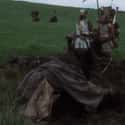-
(#5) Despite 85% Of The Population Being Peasants, Arthurian Legend Makes Them Seem Like A Minority
According to the British Library, 85% of all people in medieval Europe were peasants, but - as pointed out by Monty Python - Arthurian legend leads many to think the vast majority of people in the Middle Ages (or at least those who were important) were knights and nobles. Peasants in Monty Python and the Holy Grail are rarely mentioned; those who do appear are minor to the plot, incredibly stupid, and disgusting. Some wallow in the muck, others propose to make a bridge out of someone to prove they are made of wood and thus a witch, and one is even shown in the background of a scene smashing a cat against a wall.
In Arthurian legend, peasants are a passive collective, and Monty Python takes that to its logical extreme. There is only one named peasant - Dennis. But he, unlike every other peasant, stands up against the repression of the system. And though most of his spiel is an anachronistic Marxist criticism on the medieval political system, it also points out that the same repressed class is repressed in countless stories and legends told about the time period.
-
(#2) Storming A Castle To Save Someone Isn't Necessarily Heroic
What's more heroic than a gallant knight storming a castle to save a damsel in distress from her captors? According to Monty Python, just about anything else. "The Tale of Sir Lancelot" upends this common trope, suggesting that maybe it's not nearly as heroic as lore suggests.
After Sir Lancelot reads a note fastened to an arrow that struck his squire in the chest, the brave knight runs toward the nearby castle to save what he presumes to be an entrapped princess forced into marriage by her father. He storms the gates, slays the guards, and strikes down the castle's inhabitants... only to find that his princess is actually a pallid young man who would rather sing than rule a kingdom.
His dashed expectations put the entire situation into perspective: He has slaughtered a bunch of innocent people for no particularly good reason. When his tale is over, Sir Lancelot gets nothing out of it. He has no princess, no heroics, and - since his squire survives the arrow - no story of sacrifice and vengeance. Even his "dramatic" escape is ruined, as he's left dangling on a rope above a wedding party that has broken out into song and dance.
-
(#4) A Trojan Horse-Like Trap Is A Ridiculous Military Tactic
The French, King Arthur's greatest adversary, are not to be trifled with. They taunt the English knights, deny them a place to stay, and fire livestock at them. Though Arthur and the Knights of the Round Table make a temporary retreat after the French "fetchez la vache," Sir Bedivere comes up with a cunning plan: Copy the Greeks.
After some extremely audible construction with power tools, the squires wheel up a giant wooden rabbit to the French castle. After a bit of conversation and obvious confusion among the French guards, they bring the "Trojan" rabbit into the keep - setting the stage for Launcelot, Gallahad, and Bedivere to leap out of the rabbit at nightfall and take the French totally by surprise. The plan may have worked - if only the three knights were actually in the wooden rabbit.
Ultimately, the plan wasn't so cunning after all, not only because the knights weren't in the rabbit, but also because it was strategically terrible. It may have worked for the Greeks in the semi-mythological story of The Iliad, but realistically, if a besieging army leaves a giant wooden figure at the enemy's doorstep, it's foolish for any army to completely trust it without any scrutiny. Though the French guards may be "strange" people, they aren't fools. And like the cow before it, they immediately catapult the rabbit back at the English knights.
-
(#1) Power Shouldn't Derive From A Woman In A Lake Who Hands Out Sabers
In Arthurian legend, Arthur receives his almighty, magical blade Excalibur from Vivienne, the Lady of the Lake. Excalibur plays multiple roles in the tales - first as the literal weapon Arthur uses to lead a valiant battle against the Saxons, and then as a symbol of his virtue and power as he leads the people of Briton in a just and valiant manner.
Some people, including Arthur himself, claim his power as king derives from the blade bestowed upon him. He was chosen for the role, as kings from the late medieval and early modern eras were legitimized by divine right. But where should power really derive from?
According to Dennis, the 37-year-old peasant whom Arthur mistakes for an old woman, "Strange women lying in ponds distributing swords is no basis for a system of government," but instead, "[s]upreme executive power derives from a mandate from the masses..." Now, it's questionable whether the anarcho-syndicalist commune he suggests is any better than the monarchist tyranny he's so adamantly against, but Dennis makes a good point: "You can't expect to wield supreme executive power just 'cause some watery tart threw a sword at you."
Anyone else claiming the same would probably be written off as crazy.
-
(#8) If Faced By A Three-Headed Giant, Run Away
In "The Tale of Sir Robin," Sir Robin the Not-Quite-So-Brave-as-Sir-Lancelot is faced with what may be the most perilous of perils. Despite many signs telling the not-so-brave knight to turn away - not to mention the carcasses of three other knights pinned to a tree by a lance - Robin and his group of minstrels gallop directly into the path of a three-headed giant. Robin tries to talk his way out of the situation, but his minstrels antagonize the giant - and Robin, incidentally - by declaring Robin's (nonexistent) bravery in song. Sir Robin is faced with a confrontation so common in historical legends and stories: He must fight a monster terrorizing the countryside.
But why would he do that? Everyone who has come before him was slain by the giant's hand, there's a multitude of signs warning that the same will happen to any traveler, and he was just threatened by that very giant. He has two options: to stand and fight, or run away. If he fights, chances are he will perish just like everyone else. He takes the smarter option.
Sir Robin may be called a coward for doing so, but Monty Python is merely underscoring how absurd this common tale of "heroism" really is.
-
(#7) Passions Of A Crowd Can Often Overshadow Any Logic, Especially During A Witch Hunt
When a whole village of peasants is screaming, "A witch! Burn her!" - convinced they need to rid their village of her - it can be hard for anyone to resist getting caught up in the excitement. Monty Python deftly points out that - even in the face of ridiculous logic and a lack of any definitive evidence - the power of the crowd can be hard to resist.
During one of Monty Python and the Holy Grail's early scenes, a village dresses up a woman in a funnel hat and a carrot nose in order to convince Sir Bedivere that she's a witch, and must therefore be burned. Bedivere, brilliant as he is, is not easily convinced by their demands and accusations. For starters, it's obvious that one of the peasants wasn't, in fact, turned into a newt, despite his claim to the contrary. So, Bedivere devises a logical formula: Wood burns. Witches burn because they are made of wood. Wood floats. Ducks also float. Therefore: "If she weighs the same as a duck, she's made of wood... A witch!"
If you follow the logical reasoning, as some academics have, the rationale itself is obviously unsound, but that doesn't seem to bother anyone. Nor does the fact that the two sides of Bedivere's scales are obviously not evenly weighed. With no idea as to why the woman was accused, and lacking any hard evidence, everyone is swept up by the hysteria and condemns her.
New Random Displays Display All By Ranking
About This Tool
Have you watched the old British comedy film Monty Python and the Holy Grail? The film was released in 1975 and based on the legend of King Arthur in the Medieval, telling the story of King Arthur and the Round Table Warriors accepting the will of God to find the legend of the Holy Grail. The exquisite scenes and props that fit the historical description have won unanimous praise from critics and audiences.
This great movie worth more attention, don't miss it if you have a chance to watch it. The random tool has generated 11 items, there are some surprisingly astute lessons that people can learn from Monty Python and the Holy Grail.
Our data comes from Ranker, If you want to participate in the ranking of items displayed on this page, please click here.
















